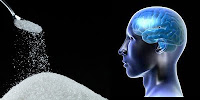Sugar and Saccharin More Addictive Than Intravenous Cocaine?
 |
| © smartaboutsugar.com |
Sayer Ji,
ContributorActivist PostSugar and artificial sweeteners are so accessible, affordable and
socially sanctioned, that few consider their habitual consumption to be a
problem on the scale of say, addiction to cocaine. But if recent
research is correct their addictive potential could be even worse.
Almost 40 years ago, William Duffy published a book called
Sugar Blues which argued that refined sugar is an addictive drug and profoundly
damaging to health. While over 1.6 million copies have been printed
since its release in 1975, a common criticism of the book has been that
it lacked sufficient scientific support.
Today, William Duffy's work is finding increasing support in the
first-hand, peer-reviewed and published scientific literature itself.
Not only is sugar drug-like in effect, but it
may be more addictive than cocaine. Worse, many sugar-free synthetic sweeteners carry with
them addictive properties and toxicities that are equal to, or may
outweigh those of sugar.
Back in 2007, a revealing study titled, "Intense sweetness surpasses
cocaine reward," found that when rats were given the option of choosing
between water sweetened with saccharin and intravenous cocaine, the
large majority of animals (94%) preferred the sweet taste of saccharin.[i] This preference for sweetness was not attributable to its unnatural
ability to induce sweetness without calories, because the same
preference was found with sucrose; nor was the preference for saccharin
overcome by increasing doses of cocaine.
A common argument against the relevance of animal
studies like this to human behavior is that rats differ too profoundly
from humans. However, even insects like forager bees have been found to
respond in a similar way to humans when given cocaine, experiencing an
overestimation of the value of the floral resources they collected, with
cessation of chronic cocaine treatment causing a withdrawal-like
response.
[ii]Researchers believe that intense sweetness activates ancient
neuroendocrine pathways within the human body, making obsessive
consumption and/or craving inevitable. The authors of the
cocaine/saccharin study summarized this connection as follows:
<blockquote class="tr_bq">Our findings clearly demonstrate that intense
sweetness can surpass cocaine reward, even in drug-sensitized and
-addicted individuals. We speculate that the addictive potential of
intense sweetness results from an inborn hypersensitivity to sweet
tastants. In most mammals, including rats and humans, sweet receptors
evolved in ancestral environments poor in sugars and are thus not
adapted to high concentrations of sweet tastants. The supranormal
stimulation of these receptors by sugar-rich diets, such as those now
widely available in modern societies, would generate a supranormal
reward signal in the brain, with the potential to override self-control
mechanisms and thus to lead to addiction.</blockquote>In a previous article, "
Is Fructose As Addictive As Alcohol?",
we looked at the addictive properties of isolated fructose in greater
depth, including over 70 adverse health effects associated with
fructose consumption. It appears that not only does fructose activate a dopamine- and opioid-mediated
hedonic pathway within the body, but like excessive alcohol consumption, exacts a
significant toll on health in exchange for the pleasure it generates.
The
drug-like properties of common beverages and foods, have been the
subject of a good deal of research over the past few decades. Wheat and
related grains, for instance, are a major food
source of opioid peptides. These pharmacologically active compounds, also
found in milk,
coffee and even
lettuce,
may even explain why ancient hunters and gatherers took the agrarian
leap over 10,000 years ago. Likely, the transition from the Paleolithic
to Neolithic was motivated by a combination of environmental pressures
and the inherently addictive properties made accessible and abundant due
to the agrarian/animal husbandry mode of civilization. For more on
this, read our essay "
The Dark Side of Wheat."
As far as synthetic sweeteners, an accumulating body of toxicological
research indicates they have a wide range of unintended, adverse health
effects beyond the aforementioned problem of addiction. For a
comprehensive list, view our
Artificial Sweetener Research page.
One clear implication of these findings is that one is best served
consuming natural sweet foods, including honey, or fruit like apples.
Not only are these easier to consume in moderation, but they have a
profound set of "side benefits" as well.
Source:-
http://www.activistpost.com/2013/01/sugar-and-saccharin-more-addictive-than.html